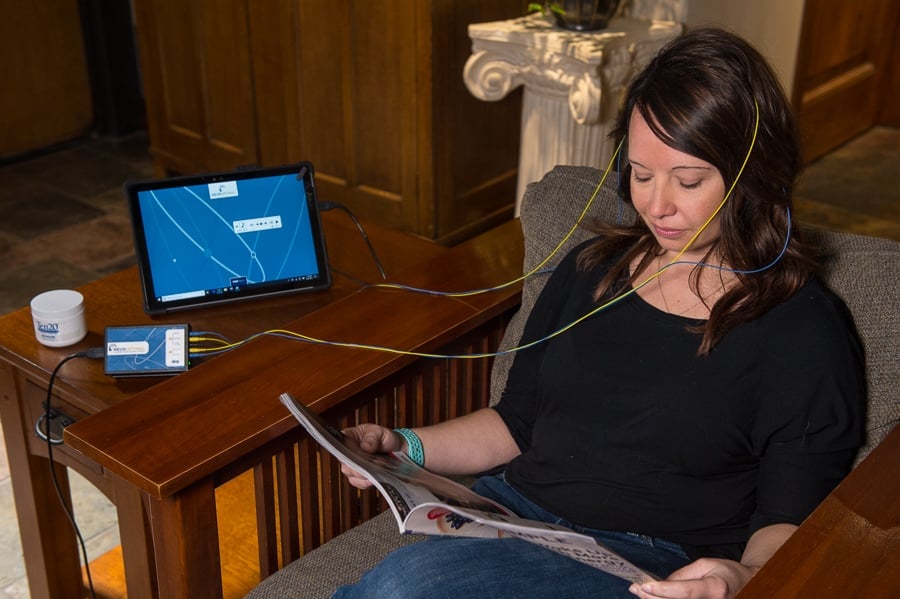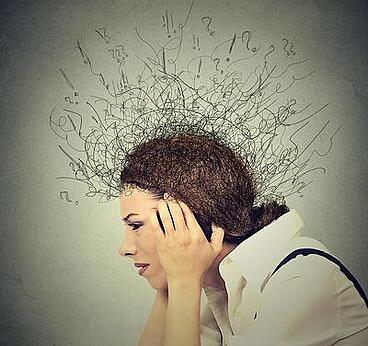3 Ways Stress Impact Relationships
A common signal that we are under continuous stress is that the quality of our sleep deteriorates. We have difficulty falling asleep, we wake up in the middle of the night and can't fall back to sleep or we wake up too early and feel compelled to get out of bed even though we are tired or did not sleep more than 6 hours. Poor sleep patterns are a signal that our brains are habituated to the hyper-arousal portion of the stress response (Zone 1).
Having our brains stuck in the hyper-arousal, stress response patterning also has a negative impact on our relationships.
Your Brain on Stress - Which Zone Do You Live In?
-Dec-19-2022-11-30-14-7313-PM.png?width=475&name=THE%20STRESS%20RESPONSE%20-%203%20zones-fight-flight%20(1)-Dec-19-2022-11-30-14-7313-PM.png) When our brains are habituated to a stress response it sends chemical and electrical signals that we are not safe. That erroneous brain signaling affects how we think about our security in relationships as well. It's like switching our clear calm-colored glasses for fearful- colored ones. We look around and see threats everywhere. Unaware that the brain signals are not an accurate emotional read for the here-and-now, but rather are most likely from the past and being repeated in the present, we take our cues from our felt experience such as physical discomfort, racing thoughts, un-ease, worry and even feeling out-right scared. Simultaneously we generate self-talk that reflects the brain habituation to a stress response. Without realizing it we are less trusting, more controlling, and sending anxious energy that is off-putting.
When our brains are habituated to a stress response it sends chemical and electrical signals that we are not safe. That erroneous brain signaling affects how we think about our security in relationships as well. It's like switching our clear calm-colored glasses for fearful- colored ones. We look around and see threats everywhere. Unaware that the brain signals are not an accurate emotional read for the here-and-now, but rather are most likely from the past and being repeated in the present, we take our cues from our felt experience such as physical discomfort, racing thoughts, un-ease, worry and even feeling out-right scared. Simultaneously we generate self-talk that reflects the brain habituation to a stress response. Without realizing it we are less trusting, more controlling, and sending anxious energy that is off-putting.
Stress Makes Us Distrustful
When we are in a chronic stress response our automatic functioning brains (not the part you consciously control) are reading a threat in the environment regularly or even continuously. Our minds will happily go along with this interpretation of reality, even though the technical definition of a threat for the brain is something that could cause us immediate bodily harm. A rabid dog about to pounce is one. Our minds start looking for the dangerous object in less-than dangerous things or people, such as our imperfect spouse or ambitious co-worker. All of this takes place without realizing the error we are making in time and place.
When that "dangerous" label is slapped on a loved one we feel distrustful and assume that our partner has done something to warrant our suspicion. We start compiling a list of things they did and said that confirms our feelings: didn't call when she was supposed to, said something we found offensive, doesn't think like us, or respond the way we would to an event. It doesn't even occur to us to stop and ask them if their intentions are to hurt us or to be self-centered at others' expense. Instead, we take the attitude of guilty until proven innocent. We want them to prove themselves to us in some way in order to be labeled trustworthy. We grill them with questions, avoid them, or....
Stress Makes Us Controlling
We attempt to control their thoughts, behaviors or feelings.
When your brain is in a stress response pattern and it is registering unsafe conditions the natural, and intelligent response, assuming the signals are accurate, would be to control oneself and as much in the environment as possible. Unfortunately, this strategy does not go over well in our day-to-day, non-crisis adult relationships. No one likes to be told who they are and what they should or shouldn't be doing but this is exactly what an anxious brain does. It fixates on the other (as a problem) and then tries to change that person as a strategy for staying safe. The fixation takes the form of constantly thinking about the other person; they are always in our thoughts. And not in a positive way, but rather, as a source of concern or worry. Here are some examples:
"Jim is spending a lot of money. How can we get him to be more conservative. He's always buying things and there will never be any left for retirement."
"I can't believe she wrote that email and copied my boss. Why is she out to get me? Maybe she wants my job. I'm going to sit in on those meetings and make sure she doesn't get a lot of time with my boss."
"Your problem is that you don't love me enough. You have to start showing it more. When was the last time you did something nice for me? You never dress up when we go out."
Read Also:
Fear and The Brain. How Neurofeedback Help: Read Elizabeth's Story
Stress Repels Others
It should be no surprise given the above two consequences of anxiety, that the third effect that it has on relationships is to repell those around us. Our goal is to feel safe and have trusting relationships but by acting out the feelings that the stress response produces makes people move away, not towards us, literally as well as emotionally. We have all had the experience of dealing with highly anxious strangers. We'd like for them to calm down, and if they don't, our next strategy is to try to create distance.
Nervous systems resonate with each other like tuning forks. For a regulated brain that is perceiving safety and in a state of relative calm, (Zone 2) it takes extra energy to gear up into the go-mode of the stress response. If we are not anxious ourselves, when we interact with people who are the first goal, often automatically sought, is to calm the other person. Men often do that by offering advice. We may try the "stop it" strategy that Bob Newhart famously employed in a comedy sketch where he played a psychotherapist treating an anxious patient. Women seek to achieve calm by listening and affirming the other person's emotional experience.
As the calmer person, if we can't get the stressed-out person to join our state, our next, again unconscious, reaction is to either become irritated or try to flee in some way. These reactions are our brains gearing up into a stress-fight response to protect ourselves from the invasive negative (registering as possibly threatening) energy of the other person's state. Our annoyance is attempting to shield us from the fearful affect. "What's wrong with you?" we may retort in an irritated tone. Or we may change the subject to something more benign. Or we may just end the conversation or remove ourselves. In all those strategies the outcome is distance and not the what the anxious person wants; when we're anxious we are seeking safety and connection.
Read Also:
What I discovered - A therapist neurofeedback review
Leaving the stressed-out person may not be a literal walking out, it could also be mental. People "check out" and stop listening. With the prevelance of smart phones it is now very easy to leave by becoming distracted in your phone. All these responses are due to the fact that a regulated brain, that lives in Zone 2, by design, does not want to gear up into a stress response and needlessly expend energy when it is not perceiving a threat.
What happens, though, is that neither person is fully aware of a new habit forming in the relationship: appearing together but actually not being connected energetically, emotionally or through understanding. Then at some point we are surprised to feel lonely, not having been aware of our role, whether it's the highly stressed-out person or calmer one.



